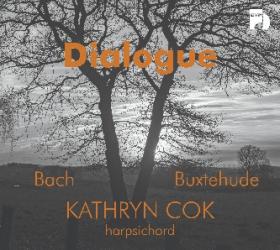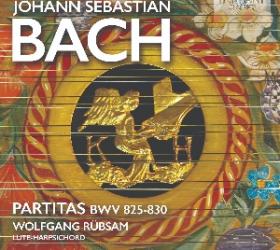
With some help from our readers
A harpsichord piece by
Henri Mulet?
In response to my article on Castelnuovo-Tedesco and his 1909 English Suite for Harpsichord (December 2009), Thomas Annand (Ottawa) wrote to ask if I was aware of a harpsichord piece by Henri Mulet? I was not, and asked Mr. Annand for further information. He referred me to Grove’s Online (now Oxford Music Online), where the catalog of Mulet’s works included a “Petit lied très facile, hpd/pf, 1910” among instrumental and chamber music listings.
Hoping to locate a score, I checked print sources, but was unable to find anything from the cited major publishers. So I turned to the leading authority on 19th- and 20th-century French organ music, Rollin Smith, who responded immediately that he knew of the piece, but did not have a copy of it. But only a few days later, he provided an Internet address (http://www.evensongmusic.net/muletfree.html) featuring a free PDF file of Mulet’s short piece in an organ adaptation by Stephen H. Best, made “from the harpsichord version.” Although this score is presented on three staves, the piece is indeed “simple” enough to play on the harpsichord manuals without any need for pedal. Beginning and ending in B minor, the “Little Song” comprises 17 measures in a gently asymmetric 5/4.
In notes to the piece, Mr. Best writes that “the Petit Lied was composed by Henri Mulet ca. 1909 and dedicated to Albert Périlhou, organist at Saint Séverin in Paris from 1889 to 1914.” He further points out that Mulet and Périlhou were colleagues at Saint Eustache during 1905.
While not an earth-shaking musical discovery, Mulet’s piece adds another charming item to the gradually increasing number of harpsichord compositions from the earliest years of the 20th-century revival.
I am grateful to Mr. Annand for directing attention to this overlooked item, and to Mr. Best for his online generosity. While visiting the website, note Best’s edition of several additional Mulet pieces for the harmonium.
More on Chopin’s Fugue in A Minor
Several readers responded to our February article, The Chopin Bicentennial: Celebrating at the Harpsichord?
Paul Cienniwa (Boston) sent word of the availability of a pristine score for Chopin’s 1841 work found at <http://www.imslp.org>.
Church musician and clavichordist Judith Conrad (Fall River, MA) wrote to confirm the availability of a harpsichord for Chopin’s use at Nohant, George Sand’s country estate.
And ever-vigilant Dallas researcher John Carroll Collins continued his mining of Chopin source materials, with results shared in two extensive letters. In his letter of 28 February 2010, Mr. Collins cited page 227 of Tad Szulc’s Chopin in Paris [New York, 1998], where the author states (without documentation) that in addition to Chopin’s Pleyel, there was also “another piano and a harpsichord in the sitting room.” (This room, along with the guest rooms, dining room, and kitchen, was situated on the ground floor; the main bedrooms and library were on the second.)
In the same letter, Collins commented on my use of quotations from the authenticity-challenged correspondence between Chopin and Delfina Potocka:
The entire matter of the letters was discussed at length by Arthur Hedley in his essay “The Chopin-Potocka Letters,” which was published as an Appendix in Selected Correspondence of Fryderyk Chopin [London and New York, 1963]. In the seventh edition of Baker’s [Biographical Dictionary] it is stated on page 983 that “Hedley was instrumental in exposing the falsity of the notorious Potocka-Chopin correspondence produced by Mme. Czernicka (who killed herself in 1949 . . . after the fraudulence was irrefutably demonstrated by Hedley at the Chopin Institute in Warsaw)”.
In further correspondence (dated 14 March 2010), Collins provided information concerning a possible date of composition for Chopin’s fugue, as well as some documentation for the composer’s interest in counterpoint:
While reading an interesting little book by Gerald Abraham, Chopin’s Musical Style (London, 1939), I came across a clue that offers a [possible] solution [to the question of the date of composition]. In the Introduction (page xii), Abraham quotes from a letter Chopin sent to Julian Fontana, “undated but apparently written in July or August 1841,” in which Chopin requests that he “send without fail Cherubini’s traité; I think it’s du contrepoint (I don’t remember the title well.” This same letter is given in full on pages 195–6 of [the Hedley book cited earlier], where it is dated “Nohant, early June 1841.”
In Hedley’s translation, Chopin asks Fontana to send him a copy of Kastner’s Treatise on Counterpoint and requests him “to fit the things into a suitable box, have them well packed and dispatch them . . . to the same address as my letters. Do please be quick about it . . . don’t delay the dispatch if he [the bookseller] has not Kastner’s book in stock. Anyhow do send Cherubini’s Treatise—I think—on Counterpoint. I don’t know the exact title.” (This book would have been Cherubini’s Cours de contrepoint et de la fugue, published in 1835.)
Collins also sent several pages from The Journal of Eugene Delacroix (translated from the French by Walter Pach [New York: Grove Press]), in which the painter noted a relevant exchange with his friend, the composer, during the last year of his brief life:
Saturday, 7 April 1849: About half past three, accompanied Chopin on his
drive . . . During the day he talked music with me, and that gave him new animation. I asked him what establishes logic in music. He made me feel what counterpoint and harmony are; how the fugue is like pure logic in music, and that to know the fugue deeply is to be acquainted with the element of all reason and all consistency in music.
Comments and news items are always welcome. Address them to Dr. Larry Palmer, Division of Music, Southern Methodist University, Dallas, TX 75275. E-mails to <[email protected]>.




